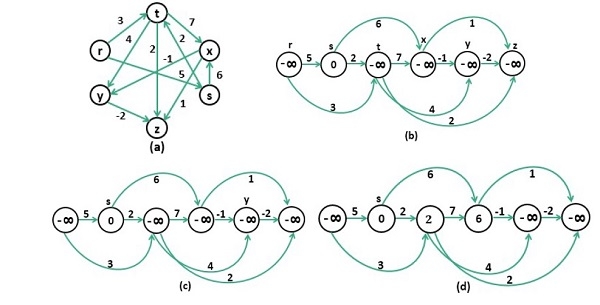
 Data Structure
Data Structure Networking
Networking RDBMS
RDBMS Operating System
Operating System Java
Java MS Excel
MS Excel iOS
iOS HTML
HTML CSS
CSS Android
Android Python
Python C Programming
C Programming C++
C++ C#
C# MongoDB
MongoDB MySQL
MySQL Javascript
Javascript PHP
PHP
- Selected Reading
- UPSC IAS Exams Notes
- Developer's Best Practices
- Questions and Answers
- Effective Resume Writing
- HR Interview Questions
- Computer Glossary
- Who is Who
Longest Path in a Directed Acyclic Graph
One weighted directed acyclic graph is given. Another source vertex is also provided. Now we have to find the longest distance from the starting node to all other vertices, in the graph.


We need to sort the nodes in topological sorting technique, and the result after the topological sort is stored into a stack. After that repeatedly popped from the stack and try to find the longest distance for each vertex.
Input and Output
Input: The cost matrix of the graph. 0 5 3 -∞ -∞ -∞ -∞ 0 2 6 -∞ -∞ -∞ -∞ 0 7 4 2 -∞ -∞ -∞ 0 -1 1 -∞ -∞ -∞ -∞ 0 -2 -∞ -∞ -∞ -∞ -∞ 0 Output: Longest Distance from Source Vertex 1 Infinity 0 2 9 8 10
Algorithm
topoSort(u, visited, stack)
Input: starting node u, the visited list to keep track, the stack.
Output − Sort the nodes in a topological way.
Begin mark u as visited for all vertex v, which is connected with u, do if v is not visited, then topoSort(v, visited, stack) done push u into the stack End
longestPath(start)
Input − The starting node.
Output − List of longest distance of all vertices from the starting node.
Begin initially make all nodes as unvisited for each node i, in the graph, do if i is not visited, then topoSort(i, visited, stack) done make distance of all vertices as - ∞ dist[start] := 0 while stack is not empty, do pop stack item and take into nextVert if dist[nextVert] ≠ - ∞, then for each vertices v, which is adjacent with nextVert, do if cost[nextVert, v] ≠ - ∞, then if dist[v] < dist[nectVert] + cost[nextVert, v], then dist[v] := dist[nectVert] + cost[nextVert, v] done done for all vertices i in the graph, do if dist[i] = - ∞, then display Infinity else display dist[i] done End
Example
#include<iostream>
#include<stack>
#define NODE 6
#define INF -9999
using namespace std;
int cost[NODE][NODE] = {
{0, 5, 3, INF, INF, INF},
{INF, 0, 2, 6, INF, INF},
{INF, INF, 0, 7, 4, 2},
{INF, INF, INF, 0, -1, 1},
{INF, INF, INF, INF, 0, -2},
{INF, INF, INF, INF, INF, 0}
};
void topoSort(int u, bool visited[], stack<int>&stk) {
visited[u] = true; //set as the node v is visited
for(int v = 0; v<NODE; v++) {
if(cost[u][v]) { //for allvertices v adjacent to u
if(!visited[v])
topoSort(v, visited, stk);
}
}
stk.push(u); //push starting vertex into the stack
}
void longestPath(int start) {
stack<int> stk;
int dist[NODE];
bool vis[NODE];
for(int i = 0; i<NODE;i++)
vis[i] = false; // make all nodes as unvisited at first
for(int i = 0; i<NODE; i++) //perform topological sort for vertices
if(!vis[i])
topoSort(i, vis, stk);
for(int i = 0; i<NODE; i++)
dist[i] = INF; //initially all distances are infinity
dist[start] = 0; //distance for start vertex is 0
while(!stk.empty()) { //when stack contains element, process in topological order
int nextVert = stk.top(); stk.pop();
if(dist[nextVert] != INF) {
for(int v = 0; v<NODE; v++) {
if(cost[nextVert][v] && cost[nextVert][v] != INF) {
if(dist[v] < dist[nextVert] + cost[nextVert][v])
dist[v] = dist[nextVert] + cost[nextVert][v];
}
}
}
}
for(int i = 0; i<NODE; i++)
(dist[i] == INF)?cout << "Infinity ":cout << dist[i]<<" ";
}
main() {
int start = 1;
cout << "Longest Distance From Source Vertex "<<start<<endl;
longestPath(start);
}
Output
Longest Distance From Source Vertex 1 Infinity 0 2 9 8 10

Advertisements
